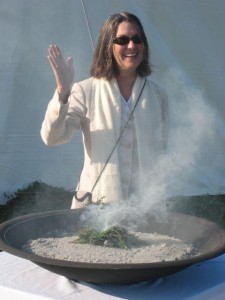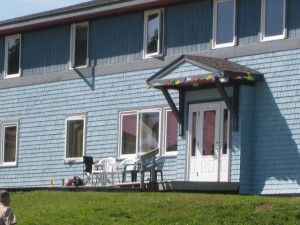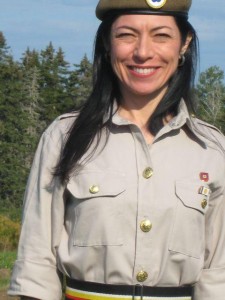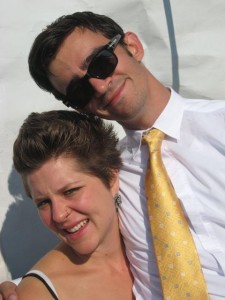Wednesday
Community ArticlesAt Home Arriving in Tatamagouche
“And what is the purpose of your visit?” the customs official at Halifax International Airport politely asked me.
“I have come to join my vajra brothers and sisters to receive the Rigden Abhisheka from my guru and the empowerment to practice the Werma Sadhana so that I may prepare myself to help establish enlightened society with the other members of the Shambhala Kingdom,” I replied.
Well, of course that’s not what I said. What do you say to an earnest customs official when you enter Nova Scotia? I pondered that question with great agitation as I waited in that airport line last weekend.
“I’m here for, um, religious reasons,” I finally said to him, hoping that this would suffice.
To my great shock, the custom’s official responded, “Oh. Are you with Shambhala? Many of your people have come through this weekend. I guess something’s going on there in Tatamagouche, eh?”
It seems that the secret is out–at least in Nova Scotia where every once in a while, the Shambhala Buddhists flock to the peninsula where the Dorje Dradul raised the Shambhala flag. The local Nova Scotians, or at least the ones I met in the airport, have come to expect us and even seem to know quite a bit about our history.
“Nova Scotia is actually supposed to be a good land for Buddhism to be practiced,” the woman at the car-rental booth informed me as I filled out the paperwork for a car. “Yeah,” she continued, “and a few years ago, there was a big Buddhist wedding of a Buddhist king and queen! It was all over the papers.” The man from the rival car-rental booth next to her leaned over and informed me that his partner was friends with the accountant of the person who owns Denma Farms. Had I heard of it?
Crossing the Halifax Bridge
As a resident of Los Angeles, I believe it is possible to interpret a culture based on its vehicular behavior: it is amazing to visit a land where people at the gas station stop to chat with you, cars don’t switch lanes to pass each other, and employees at the drive-through window of a fast-food restaurant seem willing to patiently wait while you sort through your newly exchanged Canadian dollars to figure out how to pay. When I crossed the bridge out of Halifax, the Haligonian in the toll-booth made change for me and got out of his booth to stick it into the toll-basket for me. I must have appeared in distress. I was. I’m used to driving in a city where we change lanes to get revenge on the jerk who just passed us on the highway.
While the Rigden Abhisheka itself is restricted to those who have recently completed the appropriate ngondro (preliminary practices) or attended Kalapa Assembly in the past, just the act of visiting Nova Scotia is a powerful teaching in and of itself and one I would recommend to anyone.
I, two fellow Los Angelinos, denizens of the Swiss, Austrian, Swedish, Chilean, Brazilian sanghas, and more than 200 of the other more usual suspects flooded the gates of the little Canadian airport for the Rigden Abhisheka, which was held this past week at Dorje Denma Ling. Stretching resources of this tiny land center to the limits, filling the self-composting outhouses to the brim, and testing the capacity of the local village of Tatamagouche (for a good time, say it aloud!) to support so many visitors at once, we congregated underneath the roof of Dorje Denma Ling’s newly-constructed white tent to soak in the Shambhala teachings and enjoy the brief time we had together.
Arriving at Dorje Denma Ling
I arrived at Dorje Denma Ling quite late on arrival day. It was dark, I was disoriented and cold, and I had no idea where I was going to sleep that night. I didn’t even have a sleeping bag with me, having neglected to read the participant letter very thoroughly. I was used to the vast, unforgiving terrain of Shambhala Mountain Center, where a wrong turn at night could get you lost and eaten by a bear or mountain lion. I was terrified of spending a night in a cold car with only a gomden as a pillow.
Dorje Denma Ling, in contrast with Shambhala Mountain Center, is quite contained. When you arrive there, you are there. I got out of the car and almost literally fell into the arms of Maggie Smith and Laura Leslie, two friends from Boulder with whom I had done Magyal Pomra Encampment last summer. Maggie said I was sharing a bunkbed with her and Laura in a cabin and she would take me to it. Will Perkins carried my bags and Patrick Lawler, Rusung at Dorje Denma Ling found someone to loan me a sleeping bag. “You’re at Dorje Denma Ling, Alex!”
I think Patrick was actually scolding me about my lack of preparation and poor packing, but I took it as a greeting and proclamation. As I fell into the arms of all these people with whom I had shared many cold nights in tents, many long sitting sessions, many clumsy oryoki meals, and many hours of kasung drill, I thought, “I guess these are the people I’d drive to the ends of the earth to see.” Nova Scotia might appear to be a cold place at the end of the earth, but this past week it felt just like home.






















Sep 17, 2009
Reply
I few years back I was commuting to Montreal for work. And I hate business travel. If retreat time on one of our land centers is the cradle of loving kindness, then business travel is the landmine field of confusion and anxiety. Next to my hotel was a Cuban cigar shop and back in those days I enjoyed a cigar from time to time and, of course, the Cuban cigars are illegal by the embargo in the U.S. so I wandered down one night, lonely and not wanting another night of room service and phone calls home. It was amazing. Nice people. Great collection of jazz music. If you bought a cigar, they would offer you a drink or make you a espresso drink to enjoy. And strangely the thing that drew me back night after night was the people. Everynight a new collection of men (I never saw a woman there). They were maybe a generation older and by they profession and style you might guess (at least in America) they might be pretty conservative Republican types.Their thoughts on politics and America were fresh and thoughtful. They wanted to engage on topics cultural, political, family, news of the day. I was a lot better than the hotel room or a bar.
On day they are discussing Halifax. Guardedly, using language that was utterly non-sectarian, I mention the warmth I feel for the place and that the head of my “Church” had moved they some years back.
Instantly they became excited, “You’re a Buddhist!” And go on to explain to me how much the Shambhala people have done for Halifax, how much the city had change, and how the migration of the Shambhala community was the best thing that had ever happened to city.
After that I was always “Shambhala Jon” whenever I came back. Sometimes I would be gone for a week or two, but as soon as I returned to Montreal one of the guys would recognize me and say that “Shambhala Jon — the Good American” is back in town.